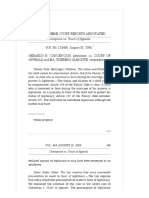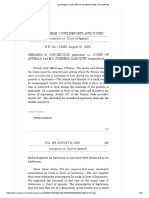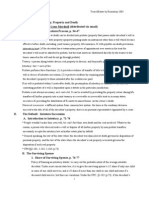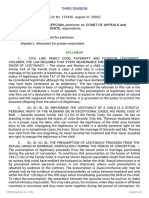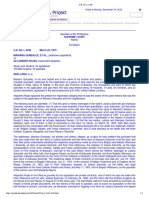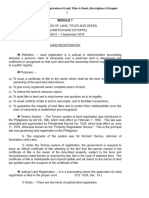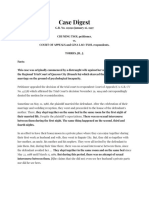ITL - WEEK 5
ITL - WEEK 5
Uploaded by
Coco PimentelCopyright:
Available Formats
ITL - WEEK 5
ITL - WEEK 5
Uploaded by
Coco PimentelOriginal Title
Copyright
Available Formats
Share this document
Did you find this document useful?
Is this content inappropriate?
Copyright:
Available Formats
ITL - WEEK 5
ITL - WEEK 5
Uploaded by
Coco PimentelCopyright:
Available Formats
INTRO (CLM1) – MODULE 6: Family Relations, Emancipation, Funerals, & Use of
Surnames 1
MODULE 6
FAMILY RELATIONS, EMANCIPATION,
and USE OF SURNAMES
WEEK 5 – 27 August 2018
THE FAMILY
❶ Family defined. – The term “family” may be defined as “the natural
and social institution which, founded on the conjugal union, binds together the
individuals who compose it for the common accomplishment of the material
and spiritual ends of life, under the authority of the original ascendant who
heads it.
⮲ The family is a basic social institution which public policy
cherishes and protects. No custom, practice, or agreement which is
destructive of the family shall be recognized or given effect.
❷ Extent of “Family Relations”. – The scope and coverage of the term
“family relations” is defined in Article 150 of the Family Code as follows:
“ARTICLE 150. – Family relations include those:
(1) Between husband and wife;
(2) Between parents and children;
(3) Among other ascendants and descendants; and
(4) Among brothers and sisters, whether of the full or
half-blood. (217a)
❸ Family solidarity. – Because of the very important role that the family
plays in nation building, it is the policy of the state to strengthen family
solidarity.
⮲ “Earnest efforts toward compromise.” – This policy of the state is
exemplified and given flesh in the provisions of Article 151 of the Family
Code, which requires that earnest efforts toward a compromise be first
exerted before action or suit between or among members of the same family
may be given due course.
⮲ “Members of the same family.” – The phrase “members of the
same family” in Article 151 refer to the persons named in Article 150 of the
Family Code above.
(a) A suit filed by the children against their father for illegally withdrawing
bank deposits in their name is covered by the rule on prior earnest efforts
INTRO (CLM1) – MODULE 6: Family Relations, Emancipation, Funerals, & Use of
Surnames 2
toward a compromise. (Jimenez vs. Jimenez, G.R. No. L-26797, 27 May
1968,
(b) A sister-in-law is a stranger with respect to the family of their spouses
and, as such, the mandatory requirement of “earnest effort toward a
compromise” does not apply to them. (Martinez vs. Martinez, G.R. No.
162084, 28 June 2005, 461 SCRA 562.)
⮲ Effect of failure to comply with Article 151. – Considering that
Article 151 starts with the negative word “No,” the requirement is mandatory
that the complaint or petition, which must be verified, should allege that
earnest efforts toward a compromise have been made but that the same
failed. If it is shown that no such efforts were in fact made, the case must be
dismissed. The attempt to compromise as well as its failure or inability to
succeed is, therefore, a condition precedent to the filling of a suit between
members of the same family in court.
THE FAMILY HOME
❶ Family home defined. – The family home is a sacred symbol of
family love and is the repository of cherished memories that last during one’s
lifetime. It is the dwelling house where the husband and wife, or an
unmarried head of a family, reside, including the land on which it is situated.
(Article 152, FC.)
⮲ Ownership of land – It is required that the family home be built on
land forming part of the the absolute community or the conjugal partnership,
or the exclusive properties of any one of the spouses, or an unmarried head
of the family. (Article 156, FC.)
❷ How constituted. – The family home is deemed constituted on a
house and lot from the time it is occupied as a family residence. (Article 152,
FC.)
⮲ From the time of its constitution, and so long as any of its
beneficiaries actually resides therein, the family home continues to be such.
(Article 153, FC.)
❸ Beneficiaries of the family home. – The beneficiaries of the family
home are:
(a) The husband and wife, or an unmarried person who is the head of a
family; and
INTRO (CLM1) – MODULE 6: Family Relations, Emancipation, Funerals, & Use of
Surnames 3
(b) Their parents, ascendants, descendants, brothers and sisters, whether
the relationship be legitimate or illegitimate, who are living in the family home
and who depend upon the head of the family for legal support. (Article 154,
FC.)
❹ Advantages of a family home. – The family home is exempt from
execution, forced sale, or attachment. It is liable only for:
(a) Non-payment of taxes;
(b) Debts incurred prior to the constitution of the family home;
(c) Debts secured by mortgage on the premises before or after such
constitution; and
(d) Debts due to laborers, mechanics, architects, builders, materialmen
and others who have rendered service or furnished material for the
construction of the building. (Article 155, FC.)
PATERNITY AND FILIATION
❶ Paternity and filiation distinguished. – Paternity is the civil status of
a father in relation to his child. Filiation, on the other hand, is the civil status
of a child in relation to his or her parents. In other words, paternity speaks of
the father’s relation to his child, while filiation refers to the child’s relation to
his or her parents.
❷ Types of filiation. – The filiation of children may be by nature, or by
adoption. (Art. 163, FC.)
⮲ Natural filiation, which is established by blood relationship, can
either be legitimate or illegitimate. (Art. 163, FC.)
⮲ Filiation may likewise be created by a judgment of adoption.
Through a judgment of adoption, a legitimate filiation is created, by legal
fiction between parent or parents, and a child.
❸ Status of children; how determined. – Under the Family Code, the
legitimacy or illegitimacy of a child attaches upon its conception. In other
words, the law and only the law determines who the legitimate or illegitimate
children are. It cannot be made dependent on the declaration of the attending
physician or midwife, or that of the mother of the newborn child.
⮲ Status must be judicially determined. – Paternity and filiation or
the lack of the same is a relationship that must be judicially established. Only
INTRO (CLM1) – MODULE 6: Family Relations, Emancipation, Funerals, & Use of
Surnames 4
the court can determine its existence or absence. It cannot be left to the will
or agreement of the parties.
❹ Legitimate children. – Legitimate children have been defined as
those conceived or born during the marriage of the parents. (Art. 164, par. 1,
FC.)
⮲ The child may be conceived before the marriage of the parents
but born after they marry each other. It may be conceived after the
celebration of the marriage and born during its subsistence, which is the usual
case. Lastly, it may be conceived during the marriage, but born after the
termination of the marriage. In all these instances the child is considered
legitimate.
⮲ Illustrative examples:
(a) Juan, a married man, has an affair with his unmarried secretary. The
secretary gets pregnant. The wife of the married man dies of a heart attack
when she learns of the pregnancy. After the death of the wife, Juan maries
the secretary. After the subsequent marriage, the child is born. Note here
that the child was conceived at the time the father is still married to another
person. However, this notwithstanding, the child will be presumed the
legitimate child of Juan and the secretary having been born during the
subsequent marriage.
(b) Honey and Sweetie are married. Honey gets pregnant after which
Sweetie dies. To alleviate her loneliness, Honey lives with Pong, who is
separated from his wife. During the cohabitation of Pong and Honey, a child
is born. The child will be considered the legitimate child of Honey and
Sweetie.
⮲ Children conceived of artificial insemination – Likewise
considered legitimate are children conceived of artificial insemination of the
wife with the sperm, either of the husband or donor, or both, provided that
both the husband and the wife authorized or ratified such insemination in a
written instrument executed and signed by them before the birth of the child.
This instrument is required to be recorded in the local civil registry together
with the birth certificate of the child. (Art. 164, par. 2, FC.)
⮲ The law favors legitimacy over illegitimacy. – There is perhaps no
presumption of the law more firmly established and founded on sounder
morality and more convincing reason than the presumption that children born
in wedlock are legitimate. This presumption, however, may be availed of only
upon convincing proof of the factual basis therefor, i.e., that the child’s
parents are legally married, and that his or her conception or birth occurs
during the subsistence of that marriage; otherwise, the presumption of law
INTRO (CLM1) – MODULE 6: Family Relations, Emancipation, Funerals, & Use of
Surnames 5
👓
that a child is legitimate does not arise. ( Read the case of Concepcion vs.
CA and Almonte, G.R. No. 123450, 31 August 2005, 468 SCRA 438.)
⮲ How to rebut presumption; grounds to impugn legitimacy – The
presumption of legitimacy of the child, however, is not conclusive and,
consequently, may be overthrown by evidence to the contrary. The grounds
for impugning the legitimacy of a child conceived or born during a valid
marriage are enumerated in Article 166 of the Family Code, to wit:
① That it was physically impossible for the husband to have sexual
intercourse with his wife within the first 120 days of the 300 days which
immediately preceded the birth of the child because of:
(a) the physical incapacity of the husband to have sexual intercourse with
his wife;
(b) the fact that the husband and wife were living separately in such a way
that sexual intercourse was not possible; or
(c) serious illness of the husband, which absolutely prevented sexual
intercourse.
② That it is proved that for biological or other scientific reasons, the child
could not have been that of the husband, except in the instance provided in
the second paragraph of Article 164; or
③ That in case of children conceived through artificial insemination, the
written authorization or ratification of either parent was obtained through
mistake, fraud, violence, intimidation, or undue influence.
⮲ Proper party to impugn legitimacy – As a rule, impugning the
legitimacy of the child is a strictly persona right of the husband for the simple
reason that he is the one directly confronted with the scandal and ridicule
which the infidelity of the wife produces, and he should be the one to decide
whether to conceal that infidelity or expose it in view of the moral and
economic interest involved. It is only in exceptional cases that his heirs are
allowed to contest such legitimacy. (Arts. 170 & 171, FC.)
⮲ Mother not allowed to declare own child illegitimate – The law
provides the presumption that the child shall be considered legitimate
although the mother may have declared against its legitimacy, or may have
been sentenced as an adulteress. (Art. 167, FC.)
❺ Illegitimate children – Generally, illegitimate children are those
conceived and born outside a valid marriage. (Art. 165, FC.) The connective
“and” between the terms “conceived” and “born” gives rise to the basic
distinction between an illegitimate child, on the one hand, and a legitimate
INTRO (CLM1) – MODULE 6: Family Relations, Emancipation, Funerals, & Use of
Surnames 6
child who is “conceived or born” during the marriage of the parents, on the
other hand.
❻ Accepted proof of filiation. – The filiation of legitimate and
illegitimate children is established by any of the following:
(a) The record of birth appearing in the civil register or a final judgment; or
(b) An admission of legitimate filiation in a public document or a private
handwritten instrument and signed by the parent concerned.
In the absence of the foregoing evidence, legitimate or illegitimate
filiation shall be proved by:
(a) The open and continuous possession of the status of a legitimate child;
or
(b) Any other means allowed by the Rules of Court and special laws.
(Arts. 172 &173, FC.)
❼ Legitimated children. –
⮲ Concept of legitimation – Legitimation is a right granted by law to
a child conceived and born outside of wedlock of parents who, at the time of
the conception of said child, were not disqualified by any impediment to marry
each other. The process of legitimation takes place automatically by the
subsequent valid marriage of the parents and, as a result of which, such
illegitimate child becomes a legitimate child of the spouses.
⮚ If the only reason for the disqualification of the parents to
marry each other, at the time their illegitimate child is conceived, is because
either or both of them are below 18 years of age, the child begotten by them
may nevertheless be legitimated. (Arts. 177 & 178, FC.)
⮲ Effects of legitimation; retroactive – Prior to the marriage of the
parents of the child, the child’s status is that of an illegitimate child since he or
she was born outside of a valid marriage. Upon the marriage of the child’s
parents, the child is automatically raised to the status of legitimacy, without
need of any additional act on the part of either the child or of the parents. A
legitimated child is to be considered as a legitimate child of the spouses from
the time of the child’s birth, and not only from the time of the marriage of the
parents, since the effects of legitimation retroacts to the time of the child’s
birth.
ADOPTION
❶ Adoption defined. – Adoption has been defined as “a juridical act
which creates between two (2) persons a relationship similar to that which
INTRO (CLM1) – MODULE 6: Family Relations, Emancipation, Funerals, & Use of
Surnames 7
results from legitimate paternity and filiation.” It is the process of making a
child, whether related or not to the adopter, possess in general, the rights
accorded to a legitimate child.
❷ Adoption is a juridical act. – Adoption is essentially a juridical act.
As such, only an adoption made through the court, or in pursuance with the
procedure laid down under the law is valid in this jurisdiction. To establish the
relation, the statutory requirements must be strictly carried out; otherwise, the
adoption is an absolute nullity. Hence, in the following cases, there cannot be
a valid adoption of the child as to grant it the rights accorded to a legitimate
child of the adopters:
(a) A written agreement for the adoption of the child between the biological
parents and the adoptive parents cannot have the effect of adoption.
(b) A child who is simply treated as a child of a certain couple, although
not related to them by blood, does not enjoy the same rights accorded to
legitimate children, in the absence of a judicial decree of adoption.
(c) The mere registration of a child in his or her birth certificate as the child
of the supposed parents is not a valid adoption and does not confer upon the
child the status of an adoptee and the legal rights of such child.
❸ Who may adopt. – Under Section 7 of Republic Act No. 8552
(otherwise known as the Domestic Adoption Act of 1998), the following may
adopt:
(a) Any Filipino of legal age, in possession of full civil capacity and legal
rights, of good moral character, has not been convicted of any crime involving
moral turpitude, emotional and psychologically capable of caring for children,
at least 16 years older than the adoptee, and who is in a position to support
and care for his children in keeping with the means of the family;
(b) Any alien possessing the same qualifications as above stated so long
as his country has diplomatic relations with the Republic of the Philippines,
and he has been living in the country for at least three (3) continuous years
prior to the filing of the application for adoption and shall maintain such
residence until an adoption decree is entered. Moreover, said alien should be
certified by his diplomatic office as having legal capacity to adopt, and that his
government allows such adoptee to enter his country as his adopted child; or
(c) The guardian of the child, upon termination of the guardianship, and
after satisfaction of his financial accountabilities.
❹ Who may be adopted. – Under Section 8 of Republic Act No. 8552
(otherwise known as the Domestic Adoption Act of 1998), the following may
be adopted:
(a) Any person below eighteen (18) years of age who has been
administratively or judicially declared available for adoption;
INTRO (CLM1) – MODULE 6: Family Relations, Emancipation, Funerals, & Use of
Surnames 8
(b) The legitimate son or daughter of one spouse, by the other spouse;
(c) An illegitimate son or daughter, by a qualified adopter, to improve
his/her status to that of legitimacy;
(d) A person of legal age if, prior to the adoption, said person has been
consistently considered and treated by the adopter as his own child since
minority;
(e) A child whose adoption has been previously rescinded;
(f) A child whose biological or adoptive parent has died. It should be
noted that no proceedings should be initiated within six (6) months from the
time of death of said parent.
❺ RA 8043. – Republic Act No. 8043, otherwise known as “The
Inter-Country Adoption Act of 1995” provides for the process of adopting a
Filipino child by a foreigner or a Filipino citizen residing abroad. This is in
accord with the policy of the State to provide every neglected and abandoned
child with a family that will provide such child with love and care as well as
opportunities for growth and development.
SUPPORT
❶ Legal support defined. – Support comprises everything
indispensable for sustenance, dwelling, clothing, medical attendance,
education and transportation, in keeping with the financial capacity of the
family.
The education of the person entitled to be supported referred to in the
preceding paragraph shall include his schooling or training for some
profession, trade or vocation, even beyond the age of majority.
Transportation shall include expenses in going to and from school, or to and
from place of work. (Art. 194, FC.)
❷ Persons obliged. – The following are obliged to support each other
to the whole extent set forth in the preceding article:
(a) The spouses;
(b) Legitimate ascendants and descendants;
(c) Parents and their legitimate children and the legitimate and illegitimate
children of the latter;
(d) Parents and their illegitimate children and the legitimate and
illegitimate children of the latter; and
(e) Legitimate brothers and sisters, whether of the full or half-blood. (Art.
195, FC.)
⮲ Brothers and sisters not legitimately related, whether of the full or
half-blood, are likewise bound to support each other, except only when the
INTRO (CLM1) – MODULE 6: Family Relations, Emancipation, Funerals, & Use of
Surnames 9
need for support of the brother or sister, being of age, is due to a cause
imputable to the claimant’s fault or negligence. (Art. 196, FC.)
❸ Order of liability for support. – Whenever two or more persons are
obliged to give support, the liability shall devolve upon the following persons
in the order herein provided:
(a) The spouse;
(b) The descendants in the nearest degree;
(c) The ascendants in the nearest degree; and
(d) The brothers and sisters. (Art. 199, FC.)
⮲ In demanding payment of the support, the person in need cannot
demand from all of them at the same time. He has to observe the order
provided in this Article. Thus, where there is no showing that the father is
without means to support his son, the paternal grandmother cannot be made
to pay for legal support to her grandson unless she is willing to provide for it.
❹ When demandable. – The obligation to give support is demandable
from the time the person who has a right to receive the same needs it for
maintenance, but it shall not be paid except from the date of judicial or
extra-judicial demand. (Art. 203, par. 1, FC.)
❺ Manner of payment. –
⮲ Payment of legal support shall be made within the first five days
of each corresponding month. (Art. 203, par. 3, FC.)
⮲ The person obliged to give support shall have the option to fulfill
the obligation either: (1) by paying the allowance fixed, or (2) by receiving and
maintaining in the family dwelling the person who has a right to receive
support. The latter alternative, however, cannot be availed of in case there is
a moral or legal obstacle thereto. (Art. 204, FC.)
PARENTAL AUTHORITY
❶ Nature of parental authority. – Parental authority and
responsibility, jointly exercised by the father and mother, necessarily includes
the caring for and rearing of their children for civic consciousness and
efficiency, and the development of their moral, mental and physical character
and well-being.
This is premised on the natural right and duty of parents over the
person and property of their children. As a consequence, parental authority
may not be renounced or transferred except in the cases authorized by law.
(Arts. 209 & 210, FC.)
❷ Exercise of parental authority. – The father and the mother shall
jointly exercise parental authority over the persons of their common children.
In case of disagreement, the father’s decision shall prevail, unless there is a
judicial order to the contrary. (Art. 211, FC.)
INTRO (CLM1) – MODULE 6: Family Relations, Emancipation, Funerals, & Use of
Surnames 10
⮲ Duties of children to parents – Article 211 of the Family Code
also commands the children to observe respect and reverence towards their
parents. This, they will observe even beyond emancipation. However, as
long as they are under parental authority, they have to obey their parents.
❸ Parental authority and the custody of children. – Custody of the
child is merely a consequence of parental authority. Thus, the person having
parental authority is entitled to the custody of the child.
⮲ Generally, since parental authority resides in both the father and
mother jointly, they are jointly entitled to the custody of their common children.
The father and mother, being the natural guardians of unemancipated
children, are duty-bound and entitled to keep them in their custody and
company.
⮲ In case of separation of parents, parental authority shall be
exercised by the parent designated by the court. Such parent so designated
obtains custody of the children.
⮲ In the case of an illegitimate child, the law designates the mother
as having sole parental authority over the child; hence, the mother has sole
right to custody over the child.
❹ Substitute parental authority. – In default of parents or a judicially
appointed guardian, the following persons shall exercise substitute parental
authority over the child in the order indicated:
(a) The surviving grandparent;
(b) The oldest brother or sister, over twenty-one years of age, unless unfit
or disqualified; and
(c) The child’s actual custodian, over twenty-one years of age, unless unfit
or disqualified. (Art. 216, FC.)
⮲ Parental preference rule – Substitute parental authority may be
exercised only in case of the death, absence, or unsuitability of both parents.
Parents are thus first in rank in matters of parental authority. If only one
parent is dead, absent, or unsuitable, the other parent exercisess sole
parental authority.
⮲ Substitute parental authority over illegitimate children – Since the
father himself is not entitled to exercise parental authority over an illegitimate
child, neither may the paternal grandparents be entitled to exercise substitute
parental authority. Hence, in the event that both the mother and the father of
an illegitimate child dies during the latter’s minority, and the child is survived
by his grandparents on both the maternal and paternal sides, only the
grandparents on the maternal side shall be entitled to exercise substitute
parental authority, if suitable.
❺ Special parental authority or loco parentis – The following persons
or entities shall have special parental authority and responsibility over minor
children under their “supervision, instruction or custody:”
(a) The school;
INTRO (CLM1) – MODULE 6: Family Relations, Emancipation, Funerals, & Use of
Surnames 11
(b) The school’s administrators and teachers; or
(c) The individual, entity or institution engaged in child care.
Note that their authority and responsibility shall apply to all “authorized
activities” whether inside or outside the premises of the school, entity or
institution. (Art. 219, FC.)
⮲ Solidary liability – The liability of those exercising special parental
authority and their administrators and the teachers involved are primary and
solidary.
⮲ Parents’ liability – The liability of the parents and the guardians
and those exercising substitute parental authority is subsidiary, i.e., they are
liable to pay the amount of damages only upon the insolvency of those who
are primarily liable.
EMANCIPATION AND AGE OF MAJORITY
⮲ Emancipation takes place by the attainment of majority. Unless
otherwise provided, majority commences at the age of eighteen years. (Art.
234, NCC.)
FUNERAL ARRANGEMENTS
⮲ The right and duty to make funeral arrangements is given to those
who during the lifetime of the deceased are obliged to give him support in
accordance with the order established for support under Article 199 of the
Family Code, to wit:
(a) The spouse;
(b) The descendant in the nearest degree;
(c) The ascendant in the nearest degree; and
(d) The brothers and sisters.
⮚ In case of descendants of the same degree, or of brothers ad
sisters, the oldest shall be preferred. In case of ascendants, the paternal
shall have a better right. (Art. 305, NCC.)
⮚ The term “spouse,” although not being preceded by any
qualification, refers to the legal husband or wife as common law marriages
are not recognized in this jurisdiction.
USE OF SURNAMES
❶ Legitimate and legitimated children shall principally use the
surname of the father.
❷ An adopted child shall bear the surname of the adopter.
INTRO (CLM1) – MODULE 6: Family Relations, Emancipation, Funerals, & Use of
Surnames 12
❸ Illegitimate children are required to use the surname of their mother,
except that in the case of voluntary recognition by the putative father, they
may use the latter’s surname. (Art. 176 of the Family Code, as amended by
Republic Act No. 9255.)
❹ A married woman may use:
(a) Her maiden first name and surname and add her husband’s surname,
or
(b) Her maiden first name and her husband’s surname, or
(c) Her husband’s full name, but prefixing a word indicating that she is his
wife, such as “Mrs.”
* * * END * * *
HAPPY READING & LEARNING!
SOURCES of NOTES:
The discussions outlined in this module have been
collectively lifted from the cases cited and commentaries
made by the authors in the references cited below:
1. Virgilio P. Alconera. Law, Persons and Family Relations (Quezon City:
Central Book Supply, Inc., 2010).
2. Rodelio T. Dascil. Threshold to the Legal Profession: An Introduction
to Law (Manila: Rex Book Store, 2013).
3. Virgilio B. Gesmundo. Jurisprudence and Comments on Persons and
Family Relations (Manila: Rex Book Store, 2014).
4. Elmer T. Rabuya. The Law on Persons and Family Relations (Manila:
Rex Book Store, Inc., 2016).
5. Rolando A. Suarez. Introduction to Law (Manila: Rex Book Store,
Inc., 2017).
We all have dreams.
But in order to make dreams come into reality,
it takes an awful lot of determination,
dedication, self-discipline, and effort.
Jesse Owens
You might also like
- Laws On Succession in The PhilippinesDocument8 pagesLaws On Succession in The Philippinesanna sheilla100% (7)
- Raising Siblings Without RivalryDocument32 pagesRaising Siblings Without RivalryMoveshade74100% (3)
- Guidelines For Adoption From IndiaDocument73 pagesGuidelines For Adoption From IndialachippaNo ratings yet
- Lecture Notes On Family RelationsDocument11 pagesLecture Notes On Family RelationsIda Marie Vega EscolanoNo ratings yet
- Marina-Wills & Trusts Rule StatementsDocument35 pagesMarina-Wills & Trusts Rule StatementsHaifa50% (2)
- Lecture Notes On Family RelationsDocument11 pagesLecture Notes On Family RelationsIda Marie Vega EscolanoNo ratings yet
- Itl - Week 5Document18 pagesItl - Week 54dzmn8t9ypNo ratings yet
- Mod6 (Itl)Document20 pagesMod6 (Itl)Tiara LlorenteNo ratings yet
- Alm1clm1 Mod6 WK5 29augDocument23 pagesAlm1clm1 Mod6 WK5 29augjanna maritheNo ratings yet
- Alm1clm1 Mod6 WK5 29augDocument23 pagesAlm1clm1 Mod6 WK5 29augElsha DamoloNo ratings yet
- The Family As An InstitutionDocument31 pagesThe Family As An InstitutionmariaceciliassantiagNo ratings yet
- 6 Persons Family Relations SY2021 2022 Lecture Notes 6Document22 pages6 Persons Family Relations SY2021 2022 Lecture Notes 6Mirasol BaykingNo ratings yet
- Crim 5 (Part 5)Document4 pagesCrim 5 (Part 5)Olivia Faye CapinpinNo ratings yet
- Declaration of Nullity and Annulment of Marriage, and Legal Separation in The PhilippinesDocument6 pagesDeclaration of Nullity and Annulment of Marriage, and Legal Separation in The Philippinesfadzram joefoxNo ratings yet
- Concepcion v. Court of Appeals 468 SCRA 438Document20 pagesConcepcion v. Court of Appeals 468 SCRA 438Rose Mary G. EnanoNo ratings yet
- Nature and Effects of AdoptionDocument19 pagesNature and Effects of AdoptionLEIGHNo ratings yet
- Law of Persons Theme 5 PDFDocument49 pagesLaw of Persons Theme 5 PDFkhumo0825No ratings yet
- Legitimate Vs Illegitimate Children - RMRamirezDocument8 pagesLegitimate Vs Illegitimate Children - RMRamirezRobert Ramirez0% (1)
- Concepcion V AlmonteDocument20 pagesConcepcion V Almontechristopher1julian1aNo ratings yet
- Family Values:: Rica Mae C. DavidDocument15 pagesFamily Values:: Rica Mae C. DavidRica Mae David BalagtasNo ratings yet
- Becoming Parents (LECTURE NOTES)Document14 pagesBecoming Parents (LECTURE NOTES)SarahNo ratings yet
- PATERNITYandFILIATION PDFDocument95 pagesPATERNITYandFILIATION PDFLEIGHNo ratings yet
- Legal Medicine, Chapter 27 Vanne Olive AgnisDocument5 pagesLegal Medicine, Chapter 27 Vanne Olive AgnisVanne AgnisNo ratings yet
- TOPIC 12-13 Legitimacy of ChildrenDocument34 pagesTOPIC 12-13 Legitimacy of ChildrenfaezaahNo ratings yet
- Dissolution of MarriageDocument16 pagesDissolution of Marriagekdjm0124No ratings yet
- 5paternity FiliationDocument7 pages5paternity FiliationPablo EschovalNo ratings yet
- Family Home Article 152Document8 pagesFamily Home Article 152Da JeNo ratings yet
- Marriage and FamilyDocument4 pagesMarriage and FamilyJenny Pasilan QuintanaNo ratings yet
- Concepcion Vs CADocument20 pagesConcepcion Vs CAAngel Pagaran AmarNo ratings yet
- Succession Finals ReviewerDocument6 pagesSuccession Finals Reviewerbabaydats.mangudadatuNo ratings yet
- PFR - Choke MeDocument43 pagesPFR - Choke MeMary Jane Rose San PedroNo ratings yet
- PFR CompiledDocument91 pagesPFR CompiledLyn Dela Cruz DumoNo ratings yet
- Crim 5 Juvenile Delinquency (Final Period)Document152 pagesCrim 5 Juvenile Delinquency (Final Period)Pershalyn AlmerolNo ratings yet
- Surrogacy DebateDocument4 pagesSurrogacy DebateTerence ValdehuezaNo ratings yet
- Title V: The FamilyDocument8 pagesTitle V: The FamilyJohn WeeklyNo ratings yet
- REPORT - Paternity and Filiation Chapter 1 (MOLINA)Document26 pagesREPORT - Paternity and Filiation Chapter 1 (MOLINA)Toni MolinaNo ratings yet
- Chapter 7Document21 pagesChapter 7Snethemba MtoloNo ratings yet
- Concepcion Vs CADocument18 pagesConcepcion Vs CAKentfhil Mae AseronNo ratings yet
- Trust and Estate OutlineDocument64 pagesTrust and Estate Outlineonly1mNo ratings yet
- Notes On Current Issues and Social ProblemsDocument16 pagesNotes On Current Issues and Social ProblemsZuleira ParraNo ratings yet
- Family IntroDocument42 pagesFamily IntroAbegail GarciaNo ratings yet
- Family Law Lecture 14 - Legitimacy AdoptionDocument48 pagesFamily Law Lecture 14 - Legitimacy AdoptionARTHUR BHEBHENo ratings yet
- Crim 5 - Module 2.3Document4 pagesCrim 5 - Module 2.3Gregorio B. SardeñaNo ratings yet
- Concepcion v. CADocument20 pagesConcepcion v. CAPrincess MadaniNo ratings yet
- CIVIL Studies and ProposalDocument1 pageCIVIL Studies and ProposalAttorneyAngieNo ratings yet
- Persons and Family Relations Final ExamDocument8 pagesPersons and Family Relations Final ExamKristine Confesor100% (1)
- Womens Rights Custory Support RemediesDocument49 pagesWomens Rights Custory Support RemediesGeramer Vere DuratoNo ratings yet
- The FamilyDocument23 pagesThe FamilyJorge Ang100% (1)
- Week 8-Marriage and The FamilyDocument30 pagesWeek 8-Marriage and The FamilyCalamansi SlüshNo ratings yet
- Chapter Four The Family A. FamilyDocument8 pagesChapter Four The Family A. FamilyGenaro II B DulatreNo ratings yet
- Family LawDocument21 pagesFamily LawslavichorseNo ratings yet
- 2016 Pre-Week Bar Lecture in Ausl (Prof. Elmer T. Rabuya) Preliminary Title & Civil PersonalityDocument27 pages2016 Pre-Week Bar Lecture in Ausl (Prof. Elmer T. Rabuya) Preliminary Title & Civil PersonalitycarinokatrinaNo ratings yet
- Concecpion v. CA PDFDocument13 pagesConcecpion v. CA PDFAlsan IgnaligNo ratings yet
- Paternity and Filiation: Art. 163-182 of The Family Code of The PhilippinesDocument45 pagesPaternity and Filiation: Art. 163-182 of The Family Code of The PhilippinesMark Paul BalaoNo ratings yet
- SW5 FamilyDocument15 pagesSW5 FamilyLeah Milca Carrasco LesmaNo ratings yet
- WILL - HEIRS and Capacity To SucceedDocument20 pagesWILL - HEIRS and Capacity To SucceedDurch HaliyaNo ratings yet
- Persons Finals Transcript 11Document5 pagesPersons Finals Transcript 11Venice Jamaila DagcutanNo ratings yet
- MODULE 5 DIFFERENT KINDS OF CHILDREN Under The Family CodeDocument5 pagesMODULE 5 DIFFERENT KINDS OF CHILDREN Under The Family CodeHanely De La PeñaNo ratings yet
- VAL ED - Ch. 4Document2 pagesVAL ED - Ch. 4iamshanvidadNo ratings yet
- SLU Law-Divorce by Elmer ClausDocument18 pagesSLU Law-Divorce by Elmer ClausMarco ClausNo ratings yet
- Persons Final ExamDocument28 pagesPersons Final ExamAnonymous FXhZbcfeGNo ratings yet
- Civil Code of The Philippines: Title X. - FuneralsDocument28 pagesCivil Code of The Philippines: Title X. - FuneralsGerard LeeNo ratings yet
- A Simple Will for Dying Well: How to Handwrite Your Own Will Without Witnesses, Notaries, or LawyersFrom EverandA Simple Will for Dying Well: How to Handwrite Your Own Will Without Witnesses, Notaries, or LawyersNo ratings yet
- G.R. No. 187167 (Magallona v. Ermita)Document36 pagesG.R. No. 187167 (Magallona v. Ermita)Coco PimentelNo ratings yet
- R.A. No. 6735Document7 pagesR.A. No. 6735Coco PimentelNo ratings yet
- G.R. No. 101083. July 30, 1993Document22 pagesG.R. No. 101083. July 30, 1993Coco PimentelNo ratings yet
- G.R. No. 183591 (Province of North Cotabato vs. The Gov't. of The RP Peace Panel On Ancestral Domain)Document209 pagesG.R. No. 183591 (Province of North Cotabato vs. The Gov't. of The RP Peace Panel On Ancestral Domain)Coco PimentelNo ratings yet
- PSGC 3Q 2023 National and Provincial SummaryDocument4 pagesPSGC 3Q 2023 National and Provincial SummaryCoco PimentelNo ratings yet
- G.R. No. L-5749Document3 pagesG.R. No. L-5749Coco PimentelNo ratings yet
- G.R. No. L-5470Document3 pagesG.R. No. L-5470Coco PimentelNo ratings yet
- G.R. No. 217910 (FALCIS, III, V. CIVIL REGISTRAR GENERAL)Document73 pagesG.R. No. 217910 (FALCIS, III, V. CIVIL REGISTRAR GENERAL)Coco PimentelNo ratings yet
- Itl - Week 2Document17 pagesItl - Week 2Coco PimentelNo ratings yet
- G.R. No. L-5449Document5 pagesG.R. No. L-5449Coco PimentelNo ratings yet
- Itl - Week 3Document7 pagesItl - Week 3Coco PimentelNo ratings yet
- Itl - Week 4Document23 pagesItl - Week 4Coco PimentelNo ratings yet
- Itl - Week 6Document11 pagesItl - Week 6Coco PimentelNo ratings yet
- G.R. No. 129163 (Arbolario vs. CA and Colinco)Document6 pagesG.R. No. 129163 (Arbolario vs. CA and Colinco)Coco PimentelNo ratings yet
- Case Digest - G.R. No. 119190Document3 pagesCase Digest - G.R. No. 119190Coco PimentelNo ratings yet
- Mother&child - Rights - Immigrants in NorwayDocument86 pagesMother&child - Rights - Immigrants in NorwayAy GunNo ratings yet
- The Morality of PlanningDocument15 pagesThe Morality of Planningangelicaannjoy02No ratings yet
- Child Adoption and Its Present Situation1Document16 pagesChild Adoption and Its Present Situation1Bijay Kumar BindariNo ratings yet
- Rubin 1984Document28 pagesRubin 1984Yến NguyễnNo ratings yet
- Sample Course MaterialDocument46 pagesSample Course MaterialreenajoseNo ratings yet
- Questionnaire Family Relationship Child: 1 Details of The ChildDocument4 pagesQuestionnaire Family Relationship Child: 1 Details of The ChildFMP MusicNo ratings yet
- Orientation On Solo Parent's ActDocument18 pagesOrientation On Solo Parent's ActIvy Peñaflorida100% (2)
- Unit 1 - SupplementDocument12 pagesUnit 1 - SupplementTracein LacillewisNo ratings yet
- Aruna & Kaushal ..APPELLANT: This Is A New Moot MemorialDocument7 pagesAruna & Kaushal ..APPELLANT: This Is A New Moot MemorialCheeta 536No ratings yet
- Shariah Law 2Document7 pagesShariah Law 2Hafsah Dmc'goNo ratings yet
- Child CustodyDocument4 pagesChild Custodyc2an100% (1)
- Gcse Sociology: Paper 1 The Sociology of Families and EducationDocument22 pagesGcse Sociology: Paper 1 The Sociology of Families and Educationyuan.DNo ratings yet
- Criminology Board Exam Q - ADocument28 pagesCriminology Board Exam Q - AFelix GatuslaoNo ratings yet
- Silsilah Bombolang Tatuil Ke Medelu Dan MekilaDocument28 pagesSilsilah Bombolang Tatuil Ke Medelu Dan MekilaJosias D TatontosNo ratings yet
- Legitimacy and LegitimationDocument22 pagesLegitimacy and LegitimationKhairul Idzwan83% (6)
- PVL1501 2021 TL 201 1 eDocument21 pagesPVL1501 2021 TL 201 1 emichelleramsarup123No ratings yet
- Using ReceivingDocument94 pagesUsing ReceivingPavlina StoqnovaNo ratings yet
- Grade 11 Career Guidance Manual For Teachers-1Document88 pagesGrade 11 Career Guidance Manual For Teachers-1Rosary QuilingNo ratings yet
- Deater Deckard1998Document19 pagesDeater Deckard1998Bianca SerafincianuNo ratings yet
- Aap Children of Gay and Lesbian ParentsDocument6 pagesAap Children of Gay and Lesbian ParentsALEXIA DANICZA APOLAYA GUARDALESNo ratings yet
- Multidimensional Family Therapy PDFDocument21 pagesMultidimensional Family Therapy PDFBakos BenceNo ratings yet
- Raine 2002 PDFDocument32 pagesRaine 2002 PDFdiyei_patoNo ratings yet
- Conflict of Laws Adoption Carmil PlatilDocument15 pagesConflict of Laws Adoption Carmil PlatilJim Jorjohn SulapasNo ratings yet
- CPS - 453-I CPS Intake Referral InstructionsDocument4 pagesCPS - 453-I CPS Intake Referral InstructionsshemariyahsworldNo ratings yet
- MKU Internal Scholarship Application Form 2023Document9 pagesMKU Internal Scholarship Application Form 2023mugambioscar47No ratings yet
- Tomas and Anor & Murray (2011) FamCA 641Document77 pagesTomas and Anor & Murray (2011) FamCA 641familylawdirectoryNo ratings yet
- FIN260 Group Assignment 8Document7 pagesFIN260 Group Assignment 8Aas AzraelNo ratings yet













